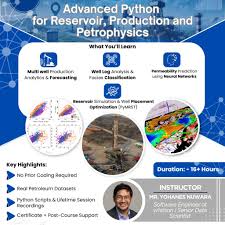About
the Program
Whether
you're just beginning your journey in petroleum data analytics or already
working in upstream domains-this course is designed to take you further.
"Advanced
Python for Reservoir, Production and Petrophysics" is a 16+ hours hands-on
certification program that blends Python programming with real-world petroleum
workflows-from production forecasting to reservoir simulation.
Powered by
Edvantage Learning Solutions, this course introduces participants to modern,
open-source Python tools and machine learning techniques that are reshaping
upstream oil & gas analytics.
Each session
is designed to bridge the gap between theoretical understanding and applied
industry practices.
Why
Learn Python for Petroleum Engineering & Petrophysics?
Traditional
petroleum workflows often rely on manual interpretation and closed-form tools.
But the energy sector is evolving.
Python is
now the industry's preferred language for:
Ø Automating repetitive tasks
Ø Analyzing large volumes of well,
core, and reservoir data
Ø Building machine learning models for
predictions
Ø Driving faster, more informed
technical decisions
Whether
you're a student exploring data science or a professional upgrading your
toolkit-Python enables you to stay relevant, efficient, and future-ready.
Key
Learning Objectives
By the end
of the course, learners will be able to:
ü Handle and analyze multi well
production data using Python
ü Apply regression and machine learning
techniques for DCA and production forecasting
ü Process and visualize well log
(LAS/DLIS) and CT scan data
ü Build facies classification models
from petrophysical logs
ü Perform exploratory analysis on core
datasets
ü Predict absolute permeability using
neural networks
ü Use PYMRST for simulating reservoir
behavior and optimizing well placement
Agenda
v Production data analytics and machine
learning
v Formation evaluation and machine
learning
v Absolute permeability prediction from
core data using neural networks
v Reservoir simulation and well
placement optimization
Who
Should Attend?
This course
is ideal for:
· Petroleum Engineers - seeking to upgrade to data-driven
workflows
· Petro physicists & Reservoir
Engineers -
exploring Al/ML in evaluation & modeling
· Data Science Enthusiasts in Energy
Sector - eager
to apply Python in upstream domains
· Final-Year Students & Researchers - working on petroleum data projects
or thesis
· Faculty Members & Trainers - integrating modern Python methods
into academic modules
No prior experience in Python is mandatory. Basic programming
awareness will be helpful but not essential.
Frequently Asked Questions (FAQs)
1. Do I need prior Python experience to attend?
No. The course is beginner-friendly. Basic programming
awareness is useful but not mandatory. All concepts are taught step-by-step
2. Will I receive a certificate after the course?
Yes, all participants will receive a Certificate of
Completion from Edvantage Learning Solutions after successful participation
3. Is the course practical or theory-based?
The course is highly practical with real-world datasets,
hands-on coding exercises, and mini-projects based on petroleum workflows.
4. What tools or software do I need?
No installations are required. We use Google Colab, a
browser-based Python notebook. You just need a laptop and internet access
5. What will I get after completing the course?
You'll receive:
· Certificate
· Python scripts and Colab notebooks
· Sample datasets
· PDF notes and cheat sheets
· Session recordings
· Access to our leamer support forum
6. Will this course help me professionally?
Absolutely. The skills taught are in demand across upstream
domains, and useful for job roles, academic research, and technical interviews.
7. Are there any assignments or projects?
Yes, each day includes guided mini-projects using real
industry data to reinforce learning and build your portfolio


